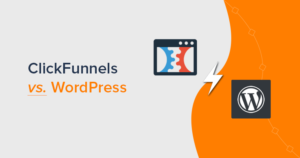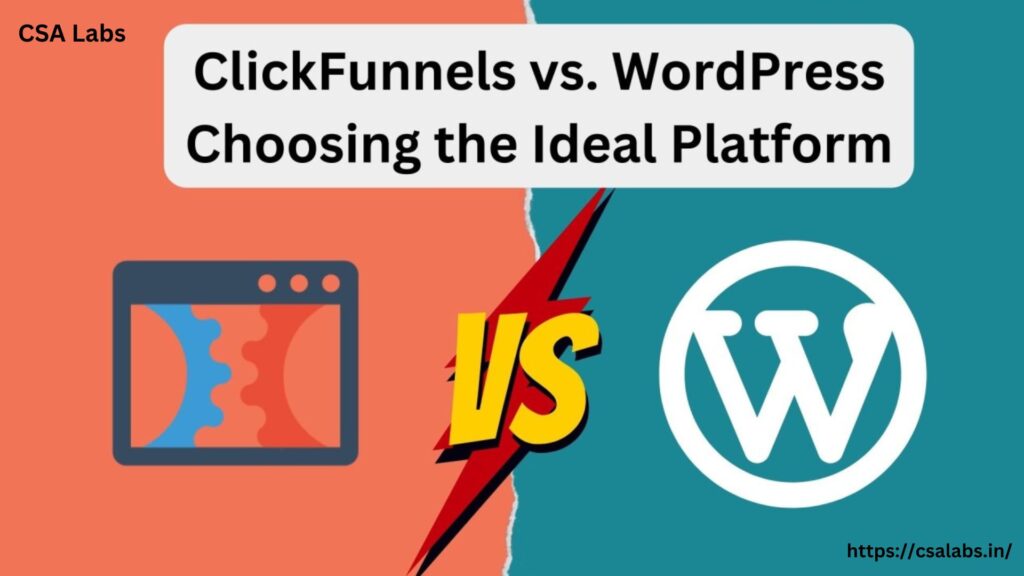Building a robust online presence hinges on choosing the right platform. In the ClickFunnels vs. WordPress showdown, these contenders go head-to-head, offering distinct pathways to digital success. Let’s dissect their features, usability, and costs, empowering you to make an informed decision tailored to your needs. Explore the ClickFunnels vs. WordPress saga with us and chart your course in the digital realm.
Understanding ClickFunnels
ClickFunnels is renowned for its ability to streamline the creation of sales funnels, making it an attractive option for those with a sales-driven focus.
Its key features include sales funnel creation, landing pages, and seamless integration with various marketing tools. ClickFunnels is ideal for product launches and lead-generation campaigns.
Exploring WordPress
WordPress, conversely, is a versatile content management system (CMS) offering a wide array of features and customization options. Known for its SEO-friendly structure, WordPress suits blogging, e-commerce, and diverse website types. Its flexibility make it a popular choice for beginners and businesses of all sizes.
ClickFunnels vs WordPress: A Comparative Analysis
Let’s talk about the differences and similarities of ClickFunnels and WordPress.
Cost Comparison
- ClickFunnels involves initial setup costs and monthly subscription fees.
- WordPress has lower initial costs and offers various free themes and plugins, though premium options are available.
Ease of Use
- ClickFunnels boasts a user-friendly interface, but beginners may experience a learning curve.
- WordPress offers an intuitive dashboard with a slightly steeper learning curve for beginners.
Design and Customisation
- ClickFunnels provides pre-designed templates for quick implementation but has limitations in customisation.
- WordPress offers extensive customisation options with thousands of themes and plugins, providing flexibility in branding.
SEO Capabilities
- ClickFunnels has limitations in SEO, making it less suitable for content-heavy websites.
- WordPress excels in SEO, providing robust tools and plugins for optimizing content and improving search engine rankings.
Pros and Cons
ClickFunnels
- Pros: Streamlined sales funnels integrated marketing tools.
- Cons: Limited customisation, higher costs.
WordPress
- Pros: Versatility, cost-effectiveness, SEO-friendly.
- Cons: Learning curve for beginners, potential for plugin conflicts.
Making the Decision
When deciding between ClickFunnels and WordPress, consider your specific needs, budget constraints, and the scalability of your online presence. Consider the learning curve, customisation requirements, and the features aligned with your business goals.
How can we help you choose between ClickFunnels vs WordPress?

Advanced Analytics Integration
CSA Labs ensures your chosen platform, ClickFunnels or WordPress, integrates seamlessly with advanced analytics tools. Monitor user behaviour, track conversions, and refine your strategies with data-driven insights.
24/7 Technical Support
Benefit from CSA Labs’ round-the-clock technical support. Whether you encounter issues with your sales funnels, website performance, or any integration, their responsive team is ready to assist, minimising downtime and ensuring a smooth online experience
Scalability Planning
We don’t just provide solutions for today; they plan for your future success. With their expertise, map out a scalable online strategy that grows with your business, whether using ClickFunnels for focused campaigns or WordPress for expansive content management.
Making the Decision with CSA Labs Support
We understand the features of ClickFunnels and WordPress, ensuring your decision aligns perfectly with your goals. Benefit from their expertise to make informed choices about features, scalability, and budget considerations.
Real-world Success Stories
Explore case studies highlighting businesses that have successfully utilised ClickFunnels and WordPress. Learn from their experiences to understand how each platform can meet specific business needs.
FAQs about ClickFunnel vs WordPress
Which platform, ClickFunnels or WordPress, is better for beginners?
ClickFunnels is known for its user-friendly interface, making it a good choice for beginners who want to set up sales funnels quickly. However, WordPress offers more versatility and control while having a steeper learning curve, making it suitable for those willing to invest time in mastering a more robust content management system.
Are there any limitations to customisation with ClickFunnels?
Yes, ClickFunnels does have some limitations when it comes to customisation. While it provides pre-designed templates for easy implementation, users may find options for customisation the look and feel of their pages somewhat restricted compared to the extensive customisation capabilities offered by WordPress.
Can I use ClickFunnels and WordPress together for my online presence?
Yes, it’s possible to use ClickFunnels and WordPress together to leverage the strengths of both platforms. For instance, you might use ClickFunnels for sales funnels and specific marketing campaigns, while WordPress serves as your primary content hub and website structure. Integration options are available to create a seamless experience for users.
Is WordPress only suitable for blogging, or can it handle e-commerce as well?
WordPress is more than just a blogging platform; it is highly versatile. Various e-commerce plugins such as WooCommerce, WordPress can effectively power online stores. Many businesses use WordPress to build robust e-commerce websites with the added advantage of extensive customisation options.
How do the costs compare between ClickFunnels and WordPress?
ClickFunnels typically involves both initial setup costs and monthly subscription fees. In contrast, WordPress is often more cost-effective initially, with the core software being free. While there may be additional costs for premium themes or plugins, maintaining a WordPress site is more flexible and scalable, making it a budget-friendly option for many users.
Conclusion
In the ClickFunnels vs WordPress debate, there is no one-size-fits-all solution. Each platform caters to different requirements, and your choice should align with your unique goals. As the online landscape evolves, regularly evaluate and adapt your chosen platform to ensure continued success in the digital realm.
Also Read : Navigating the Future of Cuisine: Food delivery app development Company
